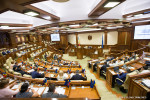
The implementation of the mixed electoral system has started late, in violation of the law, and in a way that undermines the independence of the National Commission for Establishing Single-Member Constituencies, warn two human rights NGOs.
In a statement issued Monday, Promo-LEX and the Legal Resource Center complained in particular that the Government failed to establish the National Constituencies Commission within the deadline stipulated by Law 154, and the Commission’s Regulation provides neither the nominal structure of the Commission, nor the duration of its mandate.
Law 154 requires the Government to establish the National Constituencies Commission within 30 days, a deadline which expired on August 20. Still, on August 18, two days before that deadline, the Ministry of Justice submitted for public debate the Commission’s draft Regulation. While the proposed Regulation fails to set out the Commission’s nominal makeup or its mandate, it provides rules for its activity.
However the Law states that the commission is an independent body “acting under its own regulation”. According to the NGOs, this means that “the Government’s initiative to regulate the activity of the Commission, which under the Law is supposed to to be independent and should draw up its own Activity Regulation (…) is essentially a direct interference in the work of this body and an intention to suppress its independence”.
The NGOs insist that by the deadline of August 20 the Government was supposed to only establish the Commission’s members and their terms of office, and leave the Commission at its own devices to come up with its own rules.
“We reiterate the position of Promo-LEX Association that granting the right to set up permanent single-member constituencies to a political body, namely the Government, which is subordinated to the parliamentary majority, and the failure to include the boundaries of the single-member constituencies in the Electoral Code are major deficiencies of the mixed electoral system approved by Law No 154 of 20 July 2017”, reads the statement.
The statement goes on to list other deficiencies of the proposed Regulation, such as that the member revocation procedure is not described explicitly, and that the number of civil society representatives on the Commission is limited to just one, among other issues.











